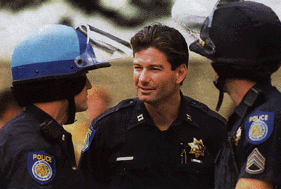

Remarks from DR. VIRGINIA KIDD
Department of Communication Studies
California State University, Sacramento
I have taught at California State University, Sacramento for over twenty years. My Ph.D. is from the U. of Minnesota in Minneapolis, but I am originally from the Gulf Coast of Texas and have a B.A. from U.T. Austin. I teach group communication, creative problem solving, public speaking, analysis of public messages, and writing for broadcasting.
Some of my best students have been police officers. When I went on a ride-along about ten years ago, I discovered why. Every encounter we had, all night long, turned on communicaton. The officer interacted with a wide range of people in very different circumstances. Sometimes he ordered people around; sometimes he jested with them; sometimes he interrogated; sometimes he expressed a tender concern. He didn't jump any fences, draw his gun, wrest a knife from a suspect, or rush Code 3 to an accident. He talked to people in the neighborhood, got information, relayed information,and arrested a few individuals peacefully after talking.
Since that night, I have been on other ride-alongs, have studied police departments, and have expanded my police knowledge greatly. Police work has changed with the advent of community policing. As I saw the changes, I realized how relevant the knowledge of the communication discipline is to the world of police work. I feel fortunate to share what I know about communication with individuals in law enforcement who can use it, and fortunate to have a police captain with a communication background to add his expertise to the theory.
Link
to Virginia Kidd's web page
at CSU Sacramento.
E-mail Virginia
Kidd.
Remarks from CAPT. RICK BRAZIEL
Promoted to Deputy Chief, fall 2002
Sacramento Police Department
As
a second generation police officer, I've been concerned with law enforcement
since even before I entered the Academy. During the time I was completing
my B.A., then M.A., in Communication Studies in the evenings, I realized
how valuable what I was learning would be to policing.
During that time I moved from the canine corps (where I was paired with my champion partner, who was great at getting his man, even if he wasn't quite so great at keeping on his collar) to being a sergeant in the chief's office dealing with budget negotiations with city leaders. Then I became a lieutenant where I had the opportunity to oversee Sacramento's first neighborhood team, the forerunner of our now active community policing program. Throughout, I applied what I was learning about communication to what I encountered in the field and in my interactions with city government, citizens, and fellow officers. I could see how valuable the knowledge from the communication field was for law enforcement.
With the growth of community policing, the need to merge information from the two fields becomes more pronounced, but a void exists between the two.COP Talk helps fill that void. We wanted a book that would relate communication techniques directly to the police world, one that was easy to read with concrete examples of how the principles fit into community policing.
I've been a cop for almost twenty years. I do triathlons and marathons (which helps reduce the stress of the job), and I am the father of two awesome daughters.
E-mail Rick Braziel.